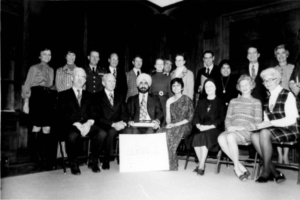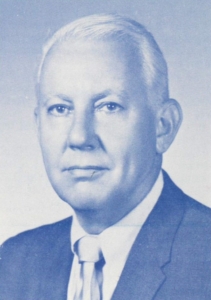Dr. Robert Nelson
The International Center’s First President
A globally minded citizen, Dr. Robert Nelson took on the reins as The International Center’s first president of the Board.
In the winter of 1972, The Indianapolis Star published a ringing endorsement of The International Center—long before the fledgling organization ever opened its doors. The article emphasized the importance of international relations and argued that The Center would create a doorway to the Circle City. In their words, “The results… should give our midland city its own array of ports of call.”
The person steering the ship toward a more global Indianapolis was The International Center’s first president: Dr. Robert G. Nelson. Nelson’s career in international affairs began decades before he led The International Center. After receiving his Doctor of Divinity from Texas Christian University, he worked for the Division of Overseas Ministries at the Disciples of Christ Church.
In this role, Nelson went on annual mission trips to Africa, sharing his spirit of kindness and philanthropy with the world. After 25 years of service, he was awarded the National Order of the Leopard in 1981—the highest honorific decoration in the Democratic Republic of the Congo.
This enthusiasm for international affairs continued with Nelson’s work in Indianapolis. He served as President of the Indiana Council on World Affairs, working closely with Mayor Lugar’s office. They worked together to establish The International Center after the 1971 Conference on Cities, and Nelson became The Center’s founding president in 1973. 
Nelson believed in the importance of cross-cultural communication, which led to The International Center’s first and biggest program: the “Lifestyles Around the World” series. According to the June 1973 newsletter, this seminar series was designed to focus on “the role of family in different areas of the world.” Panelists were invited to talk about their home countries and discuss how their cultures shape life in Indianapolis.
The series helped bring together diverse individuals and organizations from across the city, proving the potential of The Center’s programming. In his August 1973 report, Nelson emphasized the clear value of The International Center: “The fact that there are many ethnic groups and other organizations with international interests makes apparent the need of a facility and program for cross-cultural sharing and joint community action.”
Although many things have changed since Nelson first served as president, The International Center continues to carry on his legacy. They now offer a series of cross-cultural workshops that teach Hoosiers about cultural intelligence while strengthening their intercultural communication. The Center also provides cross-cultural training for expatriate employees and their employers, helping Hoosiers bridge cultural gaps and create a seamless transition for new residents.



